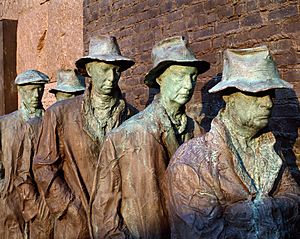Pecora Commission facts for kids
The Pecora Investigation was a big inquiry started on March 4, 1932. It was led by the United States Senate Committee on Banking and Currency. The goal was to find out what caused the Wall Street Crash of 1929. The investigation is named after Ferdinand Pecora. He was the main lawyer who led the final part of the investigation. His work showed many unfair practices in the money world. This made people want stricter rules. Because of his findings, the U.S. Congress passed important laws. These included the Glass–Steagall Banking Act of 1933, the Securities Act of 1933, and the Securities Exchange Act of 1934.
Contents
Why the Investigation Started
After the 1929 Wall Street Crash, the U.S. economy faced a very tough time. This period is known as the Great Depression. Many banks failed, and people lost their savings. The Pecora Investigation aimed to discover why the financial system collapsed.
Key People and Their Stories
As the main lawyer, Ferdinand Pecora questioned many powerful people. These included some of the most important bankers and stockbrokers in the country.
- Richard Whitney: He was the president of the New York Stock Exchange.
- Important Bankers: These included Otto Hermann Kahn, Charles E. Mitchell, Thomas W. Lamont, and Albert H. Wiggin.
- Market Speculators: People like Arthur W. Cutten, who made money by guessing how prices would change.
One famous banker, J. P. Morgan Jr., also testified. His testimony was widely reported in the news. People were very upset when he admitted that he and his partners had not paid income taxes in 1931 and 1932. This showed how some wealthy people avoided taxes while others struggled.
How the Investigation Unfolded (1932-1934)
The investigation began under a Senate that mostly had Republican members. Senator Peter Norbeck was in charge of the Banking Committee. Hearings started on April 11, 1932. However, some people, especially from the Democratic Party, said it was just a show. They thought it was meant to calm angry Americans suffering from the Great Depression.
Pecora Takes Charge
At first, two main lawyers were fired because they weren't effective. A third one quit because he wasn't given enough power to get information. In January 1933, Ferdinand Pecora was hired. He was an assistant district attorney from Manhattan. Pecora found that the investigation was not finished. He asked for more time to hold hearings.
His work on the National City Bank (now Citibank) made big headlines. The bank's president had to resign because of what Pecora uncovered. The Democrats then gained control of the Senate. The new president, Franklin D. Roosevelt, asked the new Democratic chairman, Senator Duncan U. Fletcher, to let Pecora continue. Pecora worked so hard that the investigation became known by his name, not the committee's.
What Pecora Uncovered
The Pecora Investigation found many unfair practices by banks. These included:
- Conflicts of Interest: Banks sometimes sold bad investments to pay off their own bad loans. This meant they were helping themselves, not their customers.
- "Pool Operations": Groups of people worked together to unfairly raise the price of bank stocks.
These hearings made many people support new laws for banks and the stock market.
New Laws Are Made
Because of what the Pecora Commission found, the U.S. Congress passed several important laws:
- Glass–Steagall Banking Act of 1933: This law separated regular banking (where people keep their money) from investment banking (where banks help companies sell stocks).
- Securities Act of 1933: This law set rules and penalties for giving false information about new stock offerings.
- Securities Exchange Act of 1934: This law created the Securities and Exchange Commission (SEC). The SEC's job is to regulate stock exchanges and protect investors.
The Banking Committee's hearings finished on May 4, 1934. After that, Ferdinand Pecora became one of the first commissioners of the SEC.
Lasting Impact
Historian Michael Perino says that Pecora's investigation "Forever Changed American Finance." It had a huge effect on the financial laws created during the New Deal, which were President Roosevelt's programs to help the country recover.
In 1939, Ferdinand Pecora wrote a book called Wall Street Under Oath. In it, he said that Wall Street was "bitterly hostile" to the new laws. He also wrote that if banks had been honest about their plans, they "could not long have survived the fierce light of publicity." He believed that secrecy helped bankers get away with things.
In 2010, the U.S. Congress started a similar investigation. It looked into the causes of the 2007–2008 crash of Wall Street and the economic problems that followed. This shows that Pecora's work is still important today.
 | Claudette Colvin |
 | Myrlie Evers-Williams |
 | Alberta Odell Jones |


